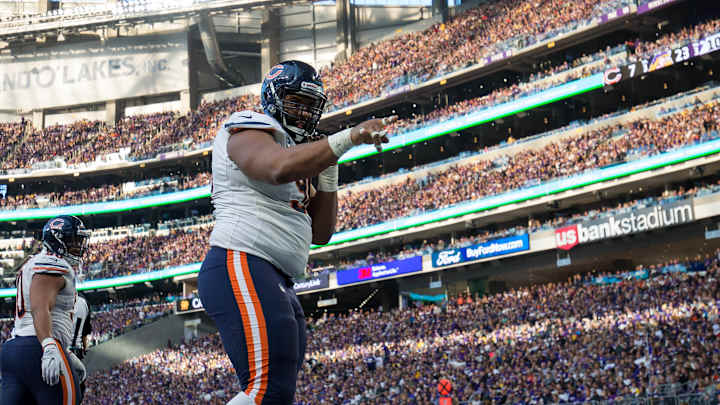Why Akiem Hicks Should Pressure Bears for Big Raise

Akiem Hicks should make a phone call to his agent and ask for a raise, perhaps even hold out for more cash.
It's not going to happen of course. Hicks is a team guy and realizes the situation and how it all works. Holdouts never seem to get resolved adequately and there are always bad feelings. Holding out when you already have a contract especially creates anamosity.
Still, it's difficult to understand how he can be the fifth highest-paid Bears player according to contract average per year, when last year proved he is either the second most valuable player on the team or even the MVP.
Hicks gets an average of $12 million a year on his deal. Ahead of him are Khalil Mack at $23.5 million, Allen Robinson at $14 million, Kyle Fuller at $13.5 million and next year in the last year of his deal Leonard Floyd gets $13.2 million.
Hicks should be getting an average of at least $15 million if not $20 million. There is speculation Allen Robinson will get a contract extension before the 2020 season starts, but in a perfect world the money should first go to Hicks.
The Bears were 3-1 when Hicks went out for eight games with a dislocated elbow, then returned to try and play with one arm for a week before heading to the sidelines.
When he came back they were 7-6.
The Bears really only had a healthy Hicks for three games, actually less than three because in the third game he injured his knee against the Washington Redskins and left, then missed the 16-6 win over the Minnesota Vikings. In the three games when they had a healthy Hicks, they allowed 13 points a game. The Oakland game went down officially as a Hicks start but he left early on the first drive with the elbow injury and wasn't real effective with one arm when he made a bold effort to come off injured reserve to lead a last-gasp bid at a playoff spot.
In the three games when Hicks started with a healthy arm and when he made his one-game comeback, the Bears allowed 76.5 yards a game rushing. They allowed 110.5 yards a game rushing in games when he didn't play.
The Raiders loss typifies his impact. The Raiders had only 13 yards on five runs before Hicks left. After he left, Oakland gained 156 yards on 34 carries.
The impact on the Bears was huge defensively, and also even offensively.
This was a team with obvious offensive problems. They had to dominate defensively to win or stay in games. Once Hicks left, the run defense decayed. The interior pass rush consistency dropped off without Hicks, who had 24 sacks and 58 hits on quarterbacks since becoming a Bear in 2016.
It obviously affected the Bears' pass rush, as they fell from 50 sacks last year to 32 this year.
The lack of leads because of the inept offense contributed to an insufficient pass rush, as well.
Without the heat on the passer, the interception total fell from 27 to 10.
Without the turnvovers setting up the anemic offense or even scoring for them, the Bears had no point production.
Dominant defensive linemen like Hicks impact every snap by the offense in some way. Yet Allen Robinson is paid far more than Hicks, and the impact of wide receivers depends on Mitchell Trubisky's success getting them the ball.
Hicks is paid less than Fuller, whose success at intercepting passes is impacted greatly by Hicks' rush.
It was obvious Hicks' absence hurt Mack's outside rush because there was less inside push flushing the quarterback or occupying his attention.
Teams will twist the salary situation to hold missed games against players. As Ryan Pace said after the season when talking about his tight ends: "Availability is critical in our league."
This is true but performance is critical, too.
Hicks has proven what kind of performer he is and the compensation doesn't fit the performance.
Twitter: BearDigest@BearsOnMaven
